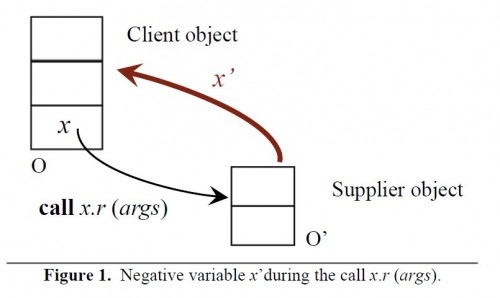In modeling object-oriented programs, for purposes of verification (proofs) or merely for a better understanding, we are faced with the unique “general relativity” property of OO programming: all the operations you write (excluding non-OO mechanisms such as static functions) are expressed relative to a “current object” which changes repeatedly during execution. More precisely at the start of a call x.r (…) and for the duration of that call the current object changes to whatever x denotes — but to determine that object we must again interpret x in the context of the previous current object. This raises a challenge for reasoning about programs; for example in a routine the notation f.some_reference, if f is a formal argument, refers to objects in the context of the calling object, and we cannot apply standard rules of substitution as in the non-OO style of handling calls.
In earlier work [1, 2] initially motivated by the development of the Alias Calculus, I introduced a notion of negative variable to deal with this issue. During the execution of a call x.r (…) the negation of x , written x’, represents a back pointer to the calling object; negative variables are characterized by axiomatic properties such as x.x’= Current and x’.(old x)= Current. Alexander Kogtenkov has implemented these ideas and refined them.
In a recent paper under submission [3], we review the concepts and applications of negative variables.
References
[1] Bertrand Meyer: Steps Towards a Theory and Calculus of Aliasing, in International Journal of Software and Informatics, 2011, available here.
[2] Bertrand Meyer: Towards a Calculus of Object Programs, in Patterns, Programming and Everything, Judith Bishop Festschrift, eds. Karin Breitman and Nigel Horspool, Springer-Verlag, 2012, pages 91-128, available here.
[3] Bertrand Meyer and Alexander Kogtenkov: Negative Variables and the Essence of Object-Oriented Programming, submitted for publication, 2012. [Updated 13 January 2014: I have removed the link to the draft mentioned in this post since it is now superseded by the new version, soon to be published, and available here.]




